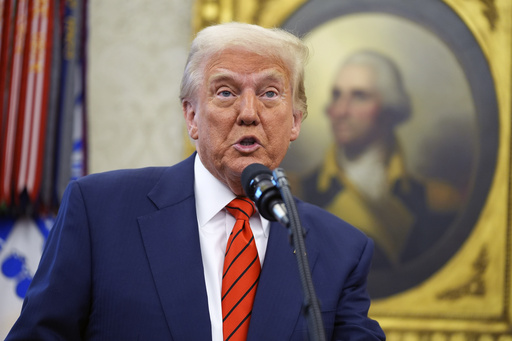
WASHINGTON — President Donald Trump reassured voters that his administration would refrain from squandering American lives and taxpayer resources on distant conflicts and nation-building efforts. However, just weeks into his second term in office, Trump revealed plans to leverage U.S. power to “take over” and rebuild Gaza, and he even hinted at reclaiming U.S. control over the Panama Canal. Additionally, he brought up the controversial idea of purchasing Greenland from Denmark, despite Denmark’s lack of interest in selling the territory.
This notable shift in rhetoric from an “America First” policy to what some interpret as “America Everywhere” has left even his closest allies astonished and questioning the seriousness of his intentions. Concerned voices from within the Republican Party, like Senator Rand Paul from Kentucky, expressed confusion on social media, stating, “The pursuit for peace should be that of the Israelis and the Palestinians. I thought we voted for America First. We have no business contemplating yet another occupation to doom our treasure and spill our soldiers’ blood.”
The President’s startling assertion for relocating approximately 1.8 million Palestinians from Gaza to develop the war-torn area into the “Riviera of the Middle East” with “long-term” American ownership stirs fresh debate about the trajectory of Trump’s foreign policy in this unconventional second term. Questions arise about whether Trump’s aggressive stance is merely an attempt to present a strong front in global affairs, a way to provide cover for Israeli Prime Minister Benjamin Netanyahu amid internal political pressure, or possibly a misguided vision reflective of his background in real estate.
Whatever the rationale, discussions surrounding Trump’s Gaza intentions have left many in Washington and beyond scratching their heads, searching for clarity in his foreign policy strategy.
As the president’s advisors attempted to calm the storm of concern regarding his plans, Trump’s call for a “world-class” renovation of Gaza took center stage. His top diplomats, Secretary of State Marco Rubio and Press Secretary Karoline Leavitt, distanced themselves from the notion of permanently relocating Gazans. Rubio described Trump’s development proposal as a “generous” offer rather than an alarming suggestion. He compared the situation in Gaza to a natural disaster, emphasizing that the area would be uninhabitable for years due to the presence of unexploded ordnance and wreckage.
While Trump did not dismiss the possibility of U.S. troop involvement in the plans, Leavitt reassured the public that any U.S. engagement would not violate taxpayer interests or come with military boots on the ground in Gaza. “It’s been made very clear to the president that the United States needs to be involved in this rebuilding effort, to ensure stability in the region for all people,” she stated, though she failed to clarify how such actions might fit into U.S. law and the expectations of regional partners like Egypt and Jordan.
Despite the administrative pushback, there remain significant hurdles in garnering support for any substantial change in Palestinian governance. The call for a collective response to the longstanding Israeli-Palestinian conflict speaks to Trump’s continuous efforts to address the deeply rooted issues that have stumped his predecessors. Leavitt emphasized that “insanity is doing the same thing over and over again and expecting different results,” praising Trump as a leader capable of innovative solutions.
Critics on the other side of the aisle have found the president’s statements to be deeply troubling and misguided. Senator Chris Coons, a Democrat from Delaware, labeled the Gaza initiative as “offensive and insane and dangerous and foolish.” He further criticized the inconsistency of Trump’s intent to dismantle international aid initiatives while proposing to tackle one of the world’s most severe humanitarian crises without established support systems.
Across the globe, Trump’s proposal has met with skepticism and hostility from various allies. The Arab League denounced the idea as a pathway to instability, while leaders from the UK and Germany highlighted the urgency for displaced Palestinians to return home, brandishing displacement as an unacceptable action against international law. Even within his own party, ally Senator Lindsey Graham vocalized that any significant American military presence in Gaza is unacceptable, advocating for a return to a strategy focused on combating Hamas.
Despite the backlash, Trump maintained that his proposal enjoyed wide support, stating in a casual conversation with reporters, “Everybody loves it.” Netanyahu lent his endorsement, calling the idea “remarkable” and advocating for its exploration and implementation to foster a better future for all involved.

